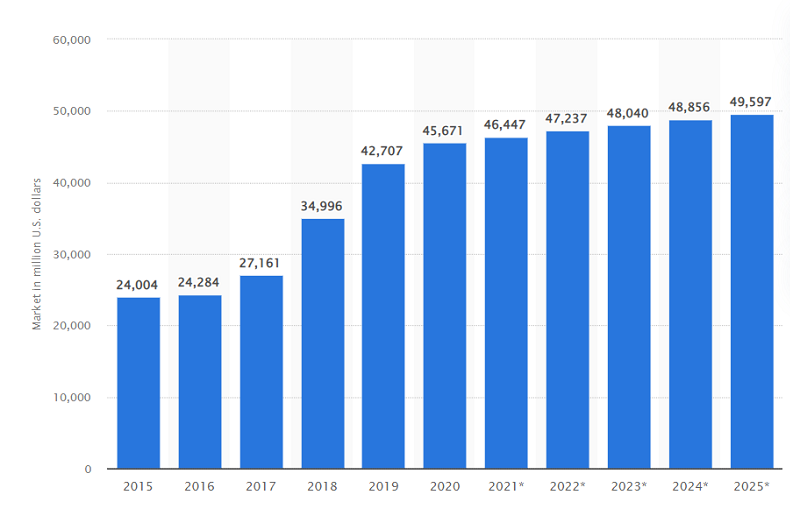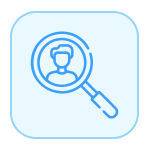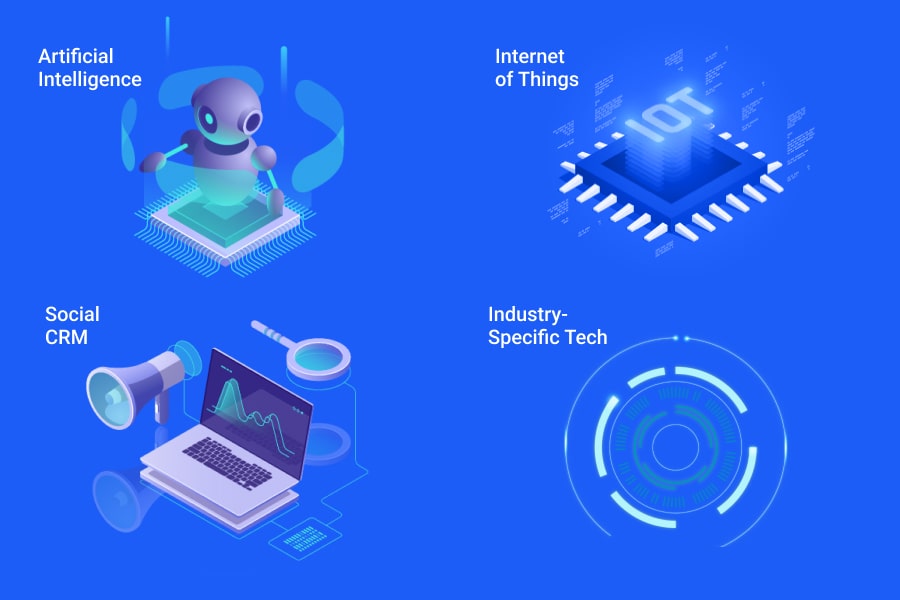Customer relationship management is a vital part of any business, regardless of the industry, company size, or target market. If you run an organization with the goal of making a profit, chances are high that you’ve got clients whose needs you have to cater to.
Naturally, this has made customer relationship management software quite popular with many turning to CRM implementation in recent years. In fact, the global market for these solutions is set to reach $49.6 billion by 2025, an increase of over $25 billion from 2015.

Seeing these figures may surprise you, or the numbers might prove what you already knew — the benefits of CRM implementation make it a highly in-demand technology. Whatever the case, it’s always a good idea to familiarize yourself with the capabilities of solutions that drive business growth.
So, in today’s post, we’re going to talk about the main benefits of CRM software and touch on the recent innovations that are making these systems even more powerful. Curious? Let’s dive in then.
Top 7 Benefits of CRM Systems for Business
As you may know, a CRM helps companies manage and improve relationships with customers by organizing and centralizing vital client information in a single platform. Overall, the system can store communication history, user behavior data, purchase records, and the like.
User-Driven Approach
Watch our webinar and learn the top ways of reducing poor user satisfaction, low adoption rates, and decreased loyalty.
Naturally, this significantly simplifies the work of sales and marketing staff and can boost overall performance of the business. Hence, it’s no surprise that the implementation of these solutions has been steadily on the rise.
Uncover the main CRM Implementation Best Practices
However, it’s important for any organizational leader to be aware of the vast advantages a CRM can offer. After all, whether you already have one incorporated into your IT infrastructure or not, knowing how certain technologies impact your business is vital.
So, let’s go over the seven advantages of CRM systems. Of course, there are a lot more than that, but we’ve chosen to zero in on the main ones that have the highest impact on any company.
1. Unified Communications

One of the primary benefits of a CRM to business is the fact that it allows for unified communications. Whether a person reaches out through a contact center, via email, or by sending a quick text — a well setup CRM platform will keep track of all of it. Thus, allowing your sales, marketing, or customer service team to always have the latest information.
Moreover, besides providing an overview of all recent communication, a CRM lets your employees contact customers from one place regardless of the chosen channel. Hence, there is no need to open an email application to send a new offer or to reach for the phone to place a call. Everything can be done from one system so that records are automatically updated.
2. Centralized Granular Insights

Another positive byproduct of implementing a CRM is the centralization of insights which allows to obtain a unified view of customers and get a better understanding about what it is that they truly require.
Additionally, having client-related details in a single repository facilitates the use of data analytics. You see, simply knowing a lot about your clients isn’t necessarily enough. You need to contextualize the gathered digital information and transform it into action.
Thanks to CRM software with built-in business intelligence, different types of data analysis can be performed. Things like detailed customer segmentation, behavior forecasts, and similar insights can be accessed with a click of a button. Thus, empowering your team with information that helps optimize service delivery.
Learn about the 6 Main Types of Data Analysis
3. Improved Efficiency

A CRM helps significantly reduce the amount of repetitive tasks a sales or customer service team has to do on a daily basis. With this tool, there is no longer any need to manually send 300 emails to prospects to keep them interested. The system will do all that for you, at the optimal time interval that you’ve set. Naturally, this enables employees to focus on more value-generating activities like one-on-one conversations or other nurturing and customer retention initiatives.
In short, a CRM can automate a large amount of workflows by reducing the need for manual data entry and repetitive communication attempts. Thus, resulting in higher levels of efficiency and a positive impact on a business’s bottom line.
Take a look at how we Automated Sales for a Car Dealer with a CRM
4. Increased Sales

As a result of a more streamlined and automated sales process, CRM implementation also leads to higher sales and revenue growth. You see, with this kind of software, you don’t have to worry about employees forgetting to follow up with a prospect or apologize to a disgruntled customer. The system will remind them of it or automatically take necessary action according to the created workflows.
Similarly, a CRM gives a boost to all of your lead generation efforts by seamlessly moving potential customers through the sales pipeline. Moreover, platforms powered by artificial intelligence and machine learning algorithms can even empower your team with suggestions on which contacts to prioritize for more deal closures or upselling and cross-selling opportunities.
As you can imagine, all this has the power to raise the average check and skyrocket your revenue. At the end of the day, who wouldn’t want that?
Find out the 5 Ways a CRM Improves Lead Generation
5. Targeted Marketing Campaigns

If you thought a CRM primarily benefits sales or customer service departments — you were misled. It can also play a major role in enhancing marketing initiatives.
You see, thanks to all that valuable customer information being stored in a single repository and analyzed by powerful algorithms, highly targeted campaigns aren’t a far-fetched dream. With a well-functioning CRM platform, you can easily customize a promotion to a specific customer segment and monitor performance in real-time to make necessary adjustments.
6. Better Customer Care

An improvement in customer care is almost certain after you implement a CRM into your IT infrastructure. After all, if your team becomes more efficient, launches more targeted marketing campaigns, and swiftly responds to queries — clients will notice.
Plus, given the detailed nature of a CRM, the insights you will possess will allow for better personalization of services. In a post-COVID, highly digital world, this is very important as the competition is fiercer than ever, and being able to keep your customers satisfied should be a top priority.
Gaining Control of Customer Engagements
What if every customer could deal with your single most effective sales or service person?
7. Higher Retention Rates

According to McKinsey, a focus on relationships and long-term value leads to much better levels of customer retention and loyalty. As you have probably gathered from all the previous advantages we’ve listed, this is precisely what a CRM delivers.
A CRM facilitates the sharing of customer information across relevant departments so that anticipating needs and solving problems becomes easier. Thus, preventing the feeling of neglect and people searching for alternatives to your offering.
So, having software that helps your team cater to unique customer needs effectively and manage relationships in a way that leads to more win-win situations is going to naturally result in higher retention rates. After all, why would clients want to switch if they’re getting everything they’ve always wanted and more with you?
Innovations Contributing to CRM Advantages
We have now discussed all of the major CRM benefits, but this article wouldn’t be complete if we didn’t touch upon the latest trends affecting this software. After all, certain innovative technologies are enhancing the capabilities of CRM platforms and thus making them even more appealing.

Artificial Intelligence
AI is definitely leaving one of the biggest impacts on CRM systems. As you know, many top-performing solutions have the ability to integrate with complementary software like contact centers, document management tools, and the like.
So, what we are seeing more of is CRMs working in tandem with AI-powered contact centers and call analytics platforms. The former is excellent at boosting sales performance by delivering conversation intelligence and dynamic call scripts that guide agents during calls. On the other hand, real-time call analytics empowers teams with highly accurate speech-to-text transcription, which helps department leaders with quality assurance.
Learn more about Conversation Intelligence for Contact Centers and CRMs
Of course, these are just some of the most exciting examples, but we shouldn’t forget that AI also plays an invaluable role in data analysis and predictive modeling. Thus, the technology can be implemented to work on the accumulated customer data to uncover hidden patterns and forecast future behavior. Thus, providing you with unparalleled intelligence.
Internet of Things
Another major trend affecting the world of CRMs and expanding the number of benefits they deliver is the incorporation of the Internet of Things (IoT). In essence, the technology helps collect information through smart remote devices so it can be excellent for providing extra intelligence on customer behavior.
For example, if you operate in the health and wellness sector and leverage a CRM that can collect data from wearables, you can start personalizing the services you offer based on a person’s activity level.
Has a customer been inactive for a while but used to work out regularly? Then, perhaps they’d respond very well to a promotion you’ve been planning on that new gym membership package.
Social CRM
Social CRM is probably on its way to becoming a must for modern-day systems. As the name suggests, the concept refers to the integration of social media channels into customer relationship management platforms. Thus, empowering teams with a comprehensive overview of what clients are discussing online, how they view the company, and a more thorough record of interactions.
Additionally, this kind of integration can truly help build lasting relationships with customers. After all, it lets you join the relevant conversations they’re having on their preferred channels and to respond promptly to any issues or concerns.
Industry-Specific CRMs
Lastly, CRMs that are created with a particular industry in mind and offering specialized capabilities are also becoming increasingly popular. Many business sectors have unique regulations that companies have to adhere to, especially when it comes to customer information. So, a CRM that accounts for these requirements can be immensely helpful.
For example, for those working in healthcare, HIPAA compliance is a must and if your CRM collects personal health data, it probably needs to follow the standards of this regulation. Thus, having a CRM that facilitates adherence with extensive data security measures can be very attractive for medical professionals.
Discover more info on HIPAA Compliant App Development
Get the Most of Your CRM
CRM system benefits are vast and that’s precisely why companies from all kinds of industries are pursuing its implementation. Further, with new technologies emerging, the capabilities of these solutions for relationship management are only expanding.
Whether you’ve already got a CRM incorporated into your IT infrastructure and are looking to enhance its potential, or if you haven’t yet had the chance to implement this type of software — don’t hesitate to reach out to Velvetech.
Our team has spent years delivering CRM consulting and development services and will be happy to help with whatever it is you require. Simply complete the contact form below and we’ll get back to you as soon as possible.











